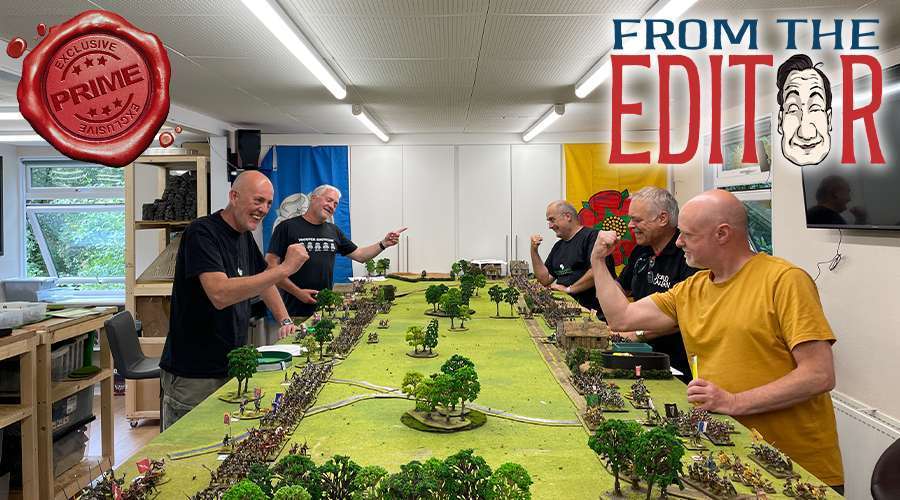A good umpire can make or break a game. I’ve played loads of multiplayer wargames that meandered along at such a tediously slow pace half of them had to be wrapped up early with a guess at what would have happened if we had another three hours. Other times players have to try and arrange another date to conclude the game, with all the associated problems that brings: e.g. “I’m on holiday from next Tuesday”.

This lot looks like trouble! It’s going to take a good umpire to keep them in order.
So, it’s a real bonus when I take part in a well-umpired, multiplayer game that concludes within a reasonable time frame. I was lucky enough to participate in one such game in the deepest, leafiest Surrey a couple of weeks ago.
Giles Shapley, who goes by the online handle of Eric the Shed, invited me and a couple of gaming pals down to sample the Shed War Experience in his war room in the woods. Giles has been running big battles in various gaming ‘sheds’ for several years, and he has now launched the venture as a small business, offering groups of gamers the opportunity to play big battles under his professional guidance.
We played a game of Never Mind the Billhooks Big Battles and there were six of us – three players on each side. One side included Giles who commanded the Yorkist right wing and umpired the game.
The players were provided with pre-game details of the scenario – the ‘what if?’ Battle of Pontefract 1460 – as well as the background, house rules, and army lists. This enabled us to hit the ground running when we arrived.

The game keeps a-rollin’ under the watching eye of Eric the Shed (black T-shirt, follically challenged).
Once ‘the games begin’ the skill of a good umpire is to keep things moving with as little player downtime as possible. If said umpire is also the host, they must provide the players with beverages and manage food breaks. It’s easy to dismiss these latter points as being petty, but if you are playing a four to six hour game they are essential. Not as important as the flow of the game though, that is crucial.
Never Mind the Billhooks lends itself well to umpire-driven games because who goes next is dictated by the turn of a card. That means the umpire can dictate the speed of the turns by drawing the ‘who goes next’ card whether the players are ready or not – no need to wait until Dave (et al) has finished his conversation with Colin about how 3D printing is going to put all figure manufactures out of business, etc. As soon as the card is drawn the umpire then demands the attention of the players, and thus things keep moving.

Giles keeps a partially troublesome cat in order; Nick from North Star.
For us, Giles was an excellent driver; he turned the cards and moved the game along when active players were engaged in combat that didn’t affect inactive ones and he didn’t allow the game to get bogged down. Rules queries were dealt with quickly, disputes settled without fuss, and a steady stream of drinks and biscuits made their way to the players!
We completed our game in five hours. It had involved about 90 units and nearly 1,500 figures, just about all of which had been engaged at some point. Five hours is by no means a short game, but under the stewardship of a less capable umpire that game could have taken twice as long, which realistically would have meant all the players would have been too tired to care who won. (I’ve played in big multiplayer battles where I’ve been gutted a unit of mine has ‘saved’ because it has further protracted the game).

All the units on the board in our game were accompanied by an ID token – another trick to keep the game flowing. This unit of pikemen belongs to Richard Lloyd aka Captain Blood, top bloke/painter.
So, I raise a glass to Eric the Shed (actually, after the game, we had time to raise several!) but more importantly to good umpires everywhere. Your skills as cat herders are much needed and appreciated.



